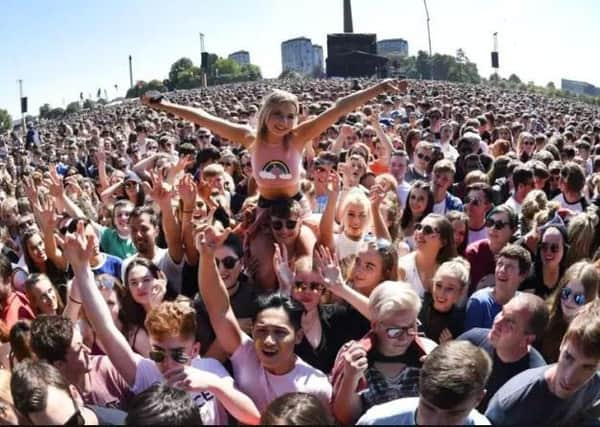Brian Ferguson: TRNSMT plan offers home truths for Glasgow


I doubt anyone would ever let me, but the chance to switch jobs, even briefly, to get a glimpse of life behind closed doors is a tantalising prospect.
I first tried to imagine myself in the shoes of others in the aftermath of the first cancellation of Edinburgh’s Hogmanay celebrations just over an hour before midnight.
Advertisement
Hide AdAdvertisement
Hide AdAt the time it seemed like the organising team had been left with no option, after the stage at the main concert in Princes Street Gardens “disintegrated” and high winds led to fears that some of the fireworks would be blown onto crowds of revellers.
But the cancellation was a PR disaster for the city and the country. Many of those behind the scenes would have known that right away. There was little they could do in the immediate aftermath other than apologise and explain why the cancellation was unavoidable as the safety concerns quickly stacked up.
The stakes are a lot higher these days, with the cheapest tickets to the street party £26-a-head, rather than mainly free as they were then, and with Edinburgh facing much more intense competition on Hogmanay.
In Glasgow, which has long since abandoned official Hogmanay celebrations in the city centre, the stakes are equally high over its biggest outdoor event, albeit one that was only staged for the first time this year.
For the TRNSMT Festival to attract 120,000 people to Glasgow Green was impressive, by any measure of success.
While there was never any question of it entirely replacing T in the Park in the calendar, the demand for tickets saw a return in 2018 being discussed by Geoff Ellis, chief executive of promoters DF Concerts even before the first band took to the stage.
DF even felt confident enough to announce the 2018 dates and start selling tickets for the second event just days after this year’s festival was held.
So it is intriguing to ponder how many meetings were held involving DF Concerts, Police Scotland and Glasgow City Council before last week’s dates switch announcement - or the nature of those discussions.
Advertisement
Hide AdAdvertisement
Hide AdIn case you missed it, the main TRNSMT event will now be held a week earlier than planned, thereby avoiding a clash with the main Orange Walk through Glasgow, after the parade’s organisers refused to budge on a previously-agreed date.
But with headliners presumably already booked for TRNSMT’s preferred dates, DF concerts has also confirmed that two shows will be held on the weekend after the main event. It may all seem like a fairly messy compromise, but it gets Glasgow out of a tricky corner.
It clearly could not afford the PR disaster of a festival being cancelled in favour of an Orange Walk due to concerns about the police being over-stretched. And the authorities could not run the risk of the Orange Order going ahead with a mass parade or demo in the city regardless during a major festival.
The TRNSMT double-header next summer is undoubtedly good news for the city as it will spread the economic benefits of the event.
But the fact TRNSMT will not go ahead on the day of the Orange Walk is likely to offer some uncomfortable home truths for the city that still lives in the shadow of bitter religious divide.